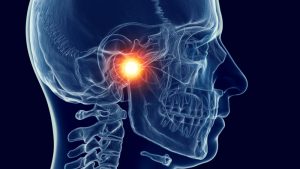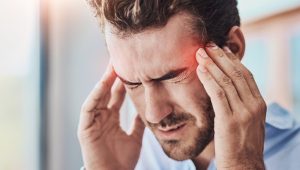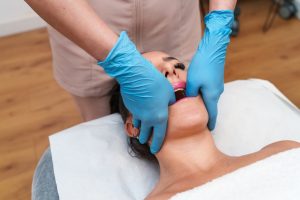The Connection Between TMJ and Headaches
Why Choose The Dental Care Group for TMJ Treatment?
If you suffer from frequent headaches, the cause may not be what you expect. Many people experience persistent pain without realizing it stems from temporomandibular joint (TMJ) disorder. This condition affects the jaw joint and surrounding muscles, often leading to chronic headaches that interfere with daily life.
At The Dental Care Group, we prioritize patient comfort and personalized care. If you’re struggling with TMJ-related headaches, call our Aventura dental office at 305-935-2797, Pembroke Pines at 954-430-2300, or Fort Lauderdale at 954-963-3706 to schedule a consultation today.
Understanding TMJ Disorder and Headaches
 Temporomandibular joint (TMJ) disorder is a condition affecting the jaw joint and surrounding muscles. Many people suffering from TMJ issues experience chronic headaches, often without realizing the connection. The pain can range from mild discomfort to debilitating migraines, impacting daily life.
Temporomandibular joint (TMJ) disorder is a condition affecting the jaw joint and surrounding muscles. Many people suffering from TMJ issues experience chronic headaches, often without realizing the connection. The pain can range from mild discomfort to debilitating migraines, impacting daily life.
The temporomandibular joint allows for jaw movement, enabling speaking, chewing, and facial expressions. When this joint becomes irritated or misaligned, it places excessive strain on muscles and nerves. This tension can radiate upwards, leading to persistent headaches and facial pain. If you experience frequent headaches without a clear cause, TMJ disorder may be the underlying issue.
How TMJ Triggers Headaches
Jaw misalignment or tension in the TMJ region can place stress on surrounding muscles. This stress often leads to:
- Tension Headaches – Tightness in the jaw muscles contributes to tension-type headaches, which feel like pressure around the head and temples.
- Migraines – TMJ dysfunction can aggravate the trigeminal nerve, a primary pathway for facial sensation, triggering migraines in some individuals.
- Referred Pain – Discomfort originating in the jaw may be perceived as pain in the temples, forehead, or even behind the eyes.
TMJ-related headaches often occur in the morning due to nighttime teeth grinding or clenching. Poor posture, stress, and improper bite alignment can also exacerbate symptoms.
Common Symptoms of TMJ-Related Headaches
Recognizing the symptoms of TMJ disorder can help you determine whether it’s the cause of your headaches. Common signs include:
Frequent headaches or migraines
- Jaw clicking or popping sounds
- Pain in the temples, cheeks, or behind the eyes
- Difficulty opening or closing the mouth fully
- Facial tension or soreness upon waking
- Neck and shoulder discomfort
- Ear pain or a sensation of fullness
If you experience these symptoms alongside chronic headaches, seeking professional evaluation is essential.
Consequences of Untreated Chronic Headaches
Ignoring persistent headaches linked to TMJ disorder can lead to worsening symptoms and long-term health consequences. Without proper treatment, chronic headaches may contribute to:
Increased Pain Sensitivity – Frequent headaches can heighten the nervous system’s response to pain, making discomfort more intense over time.
- Sleep Disruptions – TMJ-related headaches often interfere with sleep, leading to fatigue and reduced daily function.
- Reduced Concentration – Chronic pain can impair focus and productivity, making everyday tasks more difficult.
- Jaw Joint Damage – Continued strain on the TMJ can result in long-term joint deterioration, increasing the risk of arthritis and mobility issues.
- Mental Health Struggles – Ongoing headaches and TMJ pain can contribute to stress, anxiety, and even depression.
Addressing TMJ-related headaches early can prevent these complications and improve overall well-being. Reach out to The Dental Care Group for TMD treatment today in Aventura: 305-935-2797, Pembroke Pines: 954-430-2300, and Fort Lauderdale: 954-963-3706.
Treatment Options for TMJ and Headache Relief
Oral Appliances and Night Guards
A custom-fitted night guard helps prevent teeth grinding, a major contributor to TMJ stress. By keeping the jaw in a relaxed position, these appliances reduce muscle strain and minimize headaches.
Bite Adjustment Therapy
A misaligned bite can put undue stress on the jaw joint. Bite adjustment treatments realign the teeth, ensuring even distribution of pressure when biting or chewing. Orthodontic treatments like Invisalign can help alleviate TMD symptoms.
Botox for TMJ Relief
Botox injections can help relax overactive jaw muscles, reducing tension and lowering the frequency of headaches. This treatment is particularly effective for those with severe muscle clenching.
Physical Therapy and Exercises
Jaw exercises can strengthen and relax the muscles surrounding the TMJ. Gentle stretching techniques, combined with professional physical therapy, improve jaw mobility and reduce pain.
Stress Management Techniques
Stress often leads to unconscious clenching and grinding. Meditation, deep breathing exercises, and other relaxation methods can help alleviate TMJ symptoms and headaches.
Lifestyle Modifications
Avoiding hard foods, maintaining good posture, and being mindful of jaw movement can reduce strain on the TMJ. Small daily adjustments can have a significant impact on headache prevention.
Get Relief from TMJ-Related Headaches in South Florida Today
Chronic headaches shouldn’t control your life. If you suspect TMJ disorder is the cause, let The Dental Care Group provide solutions that restore comfort and improve your quality of life. Our advanced TMD treatments in South Florida target the root cause of your pain, giving you lasting relief.
Call us now at 305-935-2797 (Aventura), 954-430-2300 (Pembroke Pines), or 954-963-3706 (Fort Lauderdale) to schedule your consultation. Don’t let TMJ headaches dictate your day—take the first step toward relief today!


 Frequent headaches or migraines
Frequent headaches or migraines Increased Pain Sensitivity
Increased Pain Sensitivity